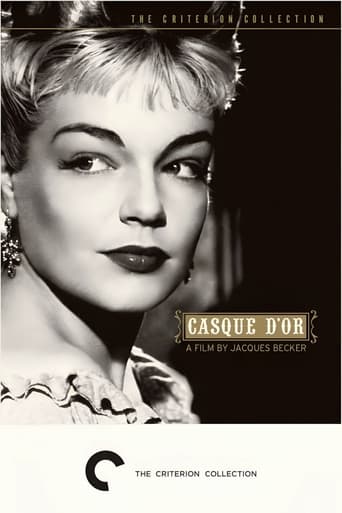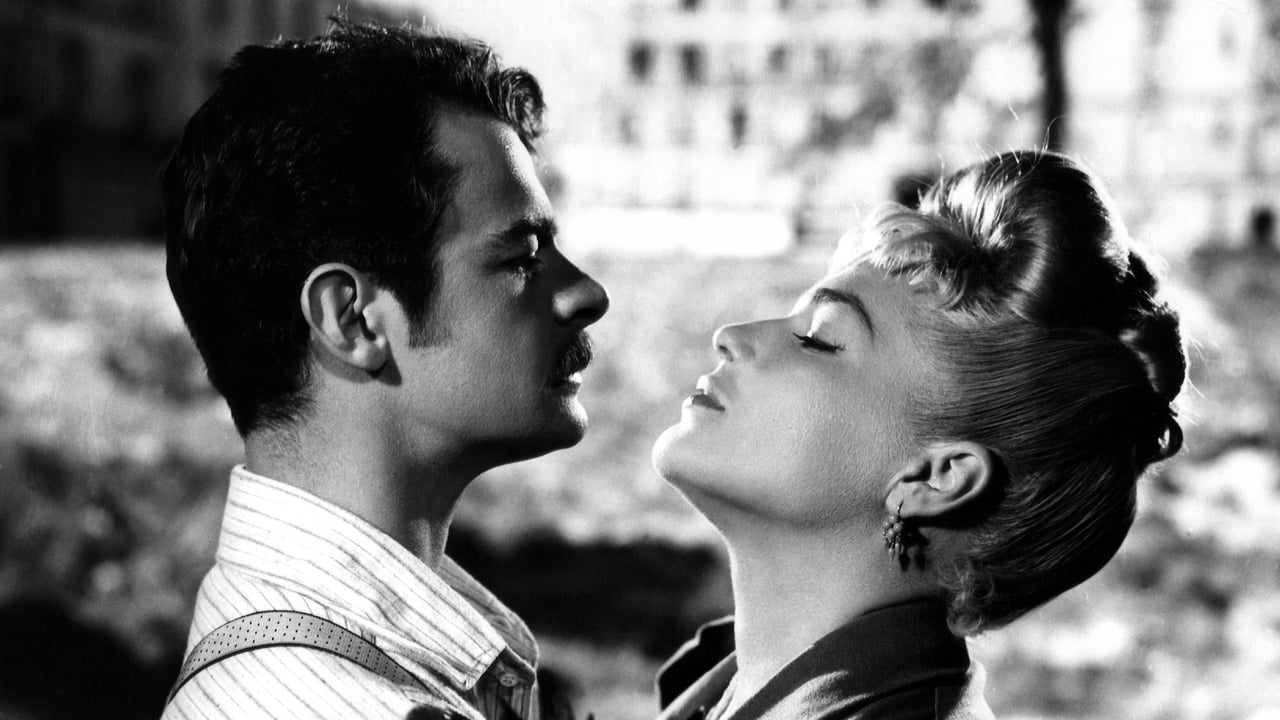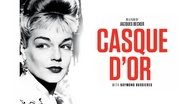christopher-underwood
This is a dream of a movie. Not full of action, yet packed with memorable moments and whole sequences. The stunning opening with the rowing boats on the river and the singing accompaniment, the slow build up and rapid denouement of the execution at the end and so much more in between. I was surprised upon opening my DVD to see the film originated in 1952 because I had imagined I had seen it upon it's London film release. The, thanks to another IMDb reviewer, I discover that the film was quickly pulled upon initial release and not released again until nine years later when it is perfectly feasible that I saw it in the West End. Simone Signoret! What can one say? Even to a youngster today, used to seeing 'stars' come and go so easily, would surely appreciate the subtle allure that seemed to come so naturally to this beautiful woman, who invigorated so many excellent films.
zetes
The basic question at the heart of Jacques Becker's 1952 film Casque d'or is whether Simone Signoret is worth destroying your entire life over. The logical answer would be no. She's pretty, but she ain't that pretty. Becker's answer is the opposite of mine. Serge Reggiani plays the ex-con, now working as a carpenter, who has the misfortune to be introduced to Signoret by his old prison buddy. Fed up with her gangster boyfriend, Signoret gleefully accepts an invitation to dance, and makes sure her boyfriend knows just how gleefully. That opens up a can of worms that the dummy could just as easily have walked away from unopened. All this film really has going for it is general prettiness. Not only Signoret, but the costumes and the cinematography are very nice. The story itself is entertaining enough, I guess, but for most of the film I was just shaking my head thinking how Simone Signoret was so not worth the trouble.
Terrell-4
This is Belle Époque Paris, which can be a dangerous world where there are few second chances, and none for lovers. Innocence seems to have been long ago wrung out of Marie (Simone Signoret). She's a prostitute and the bought woman of Roland, a handsome, arrogant member of Felix Leca's gang, a group of bullyboy thieves, pimps and murderers. Leca (Claude Dauphin) combines slyness, danger and oiliness in equal measure. Leca wants Marie, and on his terms. She's beautiful in a coarse and knowing way, with a swagger and a hand on her hip, a gangster's girl who takes being slapped as part of the life. When Marie meets Georges Manda, "Jo" (Serge Reggiani), a man who had been part of the life, had served time and now is a carpenter, everything changes. In the dance at the start of the movie, with the gangsters in their tight suits, their women in flouncy gowns and ribbons, cheap waltzes playing, beer and wine on the tables, Marie sees Jo, likes him and flirts. For Jo, he can't take his eyes off her. The music plays on, they dance. The next day Marie sets out to see Jo at his carpenter's shop. Her feelings deepen in some inexplicable way. Marie regains a measure of innocence with Jo and we watch this happen. Jo will do anything to protect her. Marie will do anything to protect Jo. Leca, always there, is determined to have his way. What first appears to be a turn-of-the-century tale about gangsters and their women turns seamlessly and with foreboding into a hopeless and emotional love story. When we last see Marie I started to choke up. Does Casque d'Or, the story of Marie and Jo, reach the level of tragedy? Probably not, but it will do. Jacques Becker, the director, didn't make many movies. He was 54 when he died. Criterion has released two. Both are excellent. Le Trou is a tough, nerve-wracking and ironic tale of several prisoners who attempt to dig their way to freedom. Touchez Pas au Grisbi is a gangster film, but even more a view of what middle age will do to us, even gangsters. You won't know whether to smile or just shake your head when Jean Gabin has to reach for his glasses to read a phone number. It also is somehow pleasantly satisfying to recall Signoret and Reggiani four years earlier in the opening and closing sequences of La Ronde, she the prostitute who loses her heart and he the soldier who quickly forgets her.
frankgaipa
One more memory game: I'd been wanting to re-see this for years after a single Pacific Film Archive screening I'm not sure what decade. Memories of style as attack, attack by aura, dancers and fighters tracing curves across the screen. Manda's one-armed grab of Marie's waist the first time he dances with her. All the film's men swaggering, strutting, dancing with pointed nonchalance. Cummerbund things. Caps, derbies. Knives. Guns?! Yes, there are guns, but those I'd forgotten. The knife fight that my memory placed near the end, High Noon style, actually starts things moving. Maybe -- I'm only slightly ashamed to say it since I know hundreds of French films -- a little bit of Chuck Jones' or Pepe le peu's France had leeched into what I remembered. Or maybe it was Popeye introduced me to apache dancers.So now I own it. Most of the story returns as I watch.Just one small thing I want to say though, that anyone else might not, has to do with what photographers call highlights. Only two characters, Marie "Casque d'or" and her Manda, get eye sparkles. Especially when they're with each other or thinking of the other or her eyes are tearing, Becker and his photographer allow a bit of maxed out exposure, to us gleam, a twinkle, a tiny bit of white screen in a black pupil. Did they manually scrape the film to allow light to show through? Some when zoomed in upon look like little crosses, or multi-pointed stars with long axes. They're quite intricate. I've never developed film, but know from converting digital images in my editing software to black and white that this is both difficult to achieve naturally with a camera and difficult to create after the fact so as to look natural. But it's no lucky stroke that the two lovers' eyes gleam. Becker did it. The only other character allowed this sparkle is Leca, a single instance, I think right before he forces himself on Marie.Light laces the film's parts. The boats of the opening emerge from a silver white landscape as simply, deceptively simply, conceived as sumi-e. The girls and the gang soon turn the light into motion on the dance floor. The "swells" are light, as is any and every sheet Marie has lain upon. Does the guillotine blade sparkle? Probably not. I've forgotten again already.Touch points? Not for light, but for motion, dance, and both male and female confidence and swagger: Carlos Saura's Carmen and Blood Wedding.


 AD
AD





